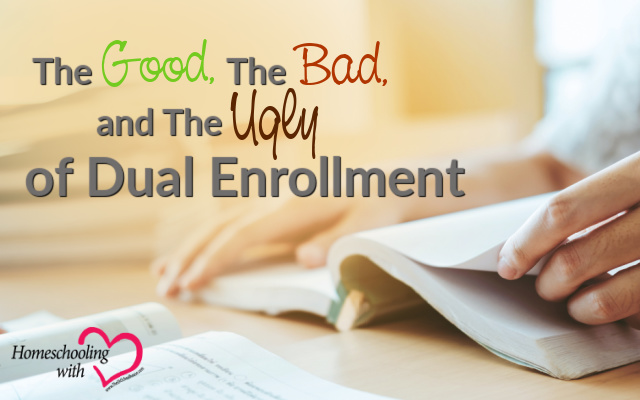The Good, The Bad, and The Ugly of Dual Enrollment


Earning both college credit and high school credit by having a high school student take college courses is a win/win! Saving money on college by taking dual enrollment classes is yet another win. Many states offer dual enrollment grants, and some states offer dual enrollment classes for free! For those who do not live in a state where dual enrollment is reduced (or free), do not be too disappointed because many colleges offer reduced rates for dual enrollment classes, making college classes quite affordable. For the rest of this article, the term, dual enrollment, will be abbreviated to DE.
Dual Credits: As mentioned, when students take a college level class while in high school, they will earn both college credit and high school credit if they pass the course. Most homeschool parents credit a one semester college course as a full year credit on a high school transcript. In other words, when students take one semester of English at the college level, they receive one full credit for English on their high school transcript.
Eligibility: Whether or not students are eligible to take dual enrollment classes will depend on the requirements set forth by each college. States that offer free DE tuition or DE grants will also have eligibility requirements. Some colleges require a student to be a certain age while others require the student to be a certain grade level. Some require the students to have a college exam test score, or they may be required to take the college’s entrance exam. The same thing holds true for state requirements. In Tennessee, a homeschooled student must have completed 10th grade to use the DE grant, and unless the student has received a 21 on the ACT (or comparable SAT), he can only take one DE class at a time using the grant. At Bryan College (also in TN), a student is required to have completed the 10th grade with a 3.0 GPA, but no college exam is necessary unless the student wants to take a higher math class. To find out your state’s policy on eligibility, simply do a google search using the terms “dual enrollment homeschoolers [and your state].” When the results appear, choose the one that’s from the official state organization (often that will be the Department of Education). Contact each college you are considering for DE classes in order to find out the eligibility requirements.
Number of Credits Earned: The number of credits earned will depend on several factors including limitations set by the state (if any), limitations set by the college where the classes are being taken, the student’s capability, and the family’s finances. There are opportunities at some colleges for high school students to earn an AA or an AS degree while still in high school. (However, before you have your student graduate with an AA or AS degree, find out if that will prevent your student from entering college as a freshman because you do not want to lose the scholarship opportunities available only to freshmen.)
Credit Limit Considerations: If you know which colleges your student is considering attending, find out from each one whether the college penalizes students for taking more than a certain number of DE courses while in high school. Even though the classes are taken before high school graduation, some colleges will classify a student who has earned a certain number of college credits as a transfer student – not as an incoming freshman – and scholarship opportunities may be lost.
On Campus or Online: Before COVID, many colleges offered both online and on-campus DE classes. Because of the required precautions being taken during the pandemic, some colleges are not allowing any DE students on campus, and for those students who prefer being in a classroom with a teacher, losing that option is disheartening. One of the benefits of taking online classes is the flexibility they usually offer the students.
Secular or Christian: Many homeschool families have chosen to homeschool for religious reasons, and many appreciate the freedom to raise their children using curriculum that supports their worldview. Although most would agree that our children should be taught varying beliefs and worldviews, students should have reached a certain maturity level before being exposed to issues and discussions that conflict with their upbringing. Many times the professors and the curriculum at a public university will not be aligned with a family’s belief system and, for that reason, some students are influenced to abandon their faith. I homeschooled my nine over a period of 32 years, and one of the often-heard regrets from my homeschooling friends has had to do with allowing their high school students to take classes at a secular college. The same warning can be extended to students attending college after high school. This is not a black-and-white issue. Many Christians not only survive, but thrive on a secular campus. Many do not. Two of my nine children completed their degrees on secular campuses. Both were married and had children by the time they graduated, so they were more mature and experienced with firm beliefs in place. In some cities, the homeschooling students band together, rating professors and offering feedback on classes offered. Many take classes together, finding comfort in having a friend in the class.
Is DE a necessity? No. If you have hesitations about this, do not worry about it. Every child is different, and graduating high school without having earned any college credit is okay. One of my sons did not want to limit his time on campus because he wanted to play baseball every season of each year. Had he taken too many DE classes, his time on campus would have been shortened. Some students are so involved in a particular curriculum, co-op, or opportunity (such as speech and debate clubs) that they do not have time to add DE classes to their schedule. That is okay! For the students who have the time and the capability, taking DE classes is a great option.
Parental oversight: Because your students are still in high school, you will want to make sure they are keeping up with their assignments and passing the tests. Colleges are not allowed to discuss anything pertaining to your student unless your student signs a FERPA, a federal form that allows the college to communicate with the parents. (They can take your money, but they cannot talk to you without that form being signed.) If your student does not pass a DE class, that failing grade becomes a part of his permanent record unless he retakes the same class and makes a better grade. Unfortunately, if the student is using a state grant to pay for the DE class, he will most likely lose that grant if he doesn’t earn and maintain a certain GPA. To retake the class may require the student to pay full price.
Now that you know the good, the bad, and the ugly of dual enrollment opportunities, you can plan according to what’s best for each of your students.
Pat Wesolowski is an author, speaker, and homeschooling mother of 9 who is now the Homeschool Specialist at Bryan College in Dayton, TN. After homeschooling her 9 children for the past 32 years, she is finally finished! Pat has a heart for helping parents find joy in their homeschooling experience and, for that reason, loves teaching workshops in order to encourage and equip parents for a fun and successful homeschool experience. Pat is the host of a podcast entitled “Homeschooling Co-op Style,” writes a blog, and has authored numerous unit studies for homeschooled students. Pat has also written a free E Resource to help parents plan for a successful high school experience: www.bryan.edu/ebook








































